| Listing 1 - 10 of 84 | << page >> |
Sort by
|
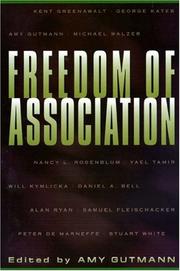
ISBN: 0691057591 0691057583 9780691057590 0691219389 Year: 1998 Volume: *1 Publisher: Princetion (N.J.): Princeton university press,
Abstract | Keywords | Export | Availability | Bookmark
 Loading...
Loading...Choose an application
- Reference Manager
- EndNote
- RefWorks (Direct export to RefWorks)
Americans are joiners. They are members of churches, fraternal and sororal orders, sports leagues, community centers, parent-teacher associations, professional associations, residential associations, literary societies, national and international charities, and service organizations of seemingly all sorts. Social scientists are engaged in a lively argument about whether decreasing proportions of Americans over the past several decades have been joining secondary associations, but no one disputes that freedom of association remains a fundamental personal and political value in the United States. "Nothing," Alexis de Tocqueville argued, "deserves more attention." Yet the value and limits of free association in the United States have not received the attention they deserve. Why is freedom of association valuable for the lives of individuals? What does it contribute to the life of a liberal democracy? This volume explores the individual and civic values of associational freedom in a liberal democracy, as well as the moral and constitutional limits of claims to associational freedom. Beginning with an introductory essay on freedom of association by Amy Gutmann, the first part of this timely volume includes essays on individual rights of association by George Kateb, Michael Walzer, Kent Greenawalt, and Nancy Rosenblum, and the second part includes essays on civic values of association by Will Kymlicka, Yael Tamir, Daniel A. Bell, Sam Fleischacker, Alan Ryan, and Stuart White.
Human rights --- United States --- Freedom of association --- Associations, institutions, etc --- 321.7 --- 342.728 --- 321.01 --- Democratie. Plurale samenleving. Pluralisme. Democratische pluraliteit--(moderne democratie politieke stelsels) --- Vrijheid van vereniging --- Algemene staatsleer. Politieke filosofie. Staatsleer. Staatstheorie --- 321.01 Algemene staatsleer. Politieke filosofie. Staatsleer. Staatstheorie --- 342.728 Vrijheid van vereniging --- 321.7 Democratie. Plurale samenleving. Pluralisme. Democratische pluraliteit--(moderne democratie politieke stelsels) --- Associations, institutions, etc. --- Alamo Case. --- Boston. --- British trade unions. --- California. --- Chinese immigrants. --- Ellis Island Museum. --- Friendly Societies. --- Hume, David. --- Jencks, Christopher. --- Lamme, Ary. --- McKenzie, Evan. --- Orthodox Jews. --- affirmative action. --- anti-Semitism. --- bilingual education. --- boycotts. --- capitalism. --- civic virtue. --- cultural pluralism. --- distributive justice. --- economic competition. --- employment. --- federal government. --- financial gain. --- garden city movement. --- hazardous waste facilities. --- holidays. --- imperialism. --- individualism. --- interest groups. --- leadership training. --- mass media. --- natural resources. --- opinion polls. --- parades. --- philosophy. --- political violence. --- Associacions, institucions, etc. --- Llibertat d'associació --- Freedom of association - United States --- Associations, institutions, etc - United States --- United States of America
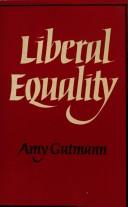
ISBN: 052122828X 052129665X 9780521228282 Year: 1980 Publisher: Cambridge : Cambridge university press,
Abstract | Keywords | Export | Availability | Bookmark
 Loading...
Loading...Choose an application
- Reference Manager
- EndNote
- RefWorks (Direct export to RefWorks)
Political philosophy. Social philosophy --- Equality --- Liberalism --- #SBIB:321H50 --- Liberal egalitarianism --- Liberty --- Political science --- Social sciences --- Egalitarianism --- Inequality --- Social equality --- Social inequality --- Sociology --- Democracy --- Westerse politieke en sociale theorieën vanaf de 19e eeuw: liberalisme --- Equality. --- Liberalism.
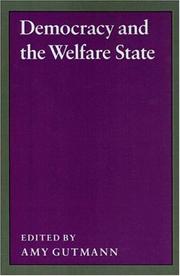
ISBN: 0691022755 0691077568 9780691077567 9780691022758 0691217955 Year: 1988 Publisher: Princeton (N.J.): Princeton university press,
Abstract | Keywords | Export | Availability | Bookmark
 Loading...
Loading...Choose an application
- Reference Manager
- EndNote
- RefWorks (Direct export to RefWorks)
Social policy --- Political systems --- Sociology of work --- Democracy --- Public welfare --- Welfare state --- Démocratie --- Aide sociale --- Etat providence --- Democracy. --- Welfare state. --- Démocratie --- State, Welfare --- Economic policy --- State, The --- Welfare economics --- Self-government --- Political science --- Equality --- Representative government and representation --- Republics --- Public welfare - United States.
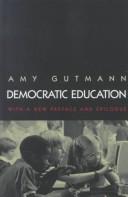
ISBN: 0691077363 9780691077369 Year: 1987 Publisher: Princeton (N.J.): Princeton university press,
Abstract | Keywords | Export | Availability | Bookmark
 Loading...
Loading...Choose an application
- Reference Manager
- EndNote
- RefWorks (Direct export to RefWorks)
Education --- Democracy --- Education and state --- Aims and objectives --- Citizen participation --- -Education and state --- -Democracy --- -#C9201 --- Self-government --- Political science --- Equality --- Representative government and representation --- Republics --- Education policy --- Educational policy --- State and education --- Social policy --- Endowment of research --- Children --- Education, Primitive --- Education of children --- Human resource development --- Instruction --- Pedagogy --- Schooling --- Students --- Youth --- Civilization --- Learning and scholarship --- Mental discipline --- Schools --- Teaching --- Training --- -Citizen participation --- Government policy --- Pedagogiek en onderwijskunde --- Citizen participation. --- didactische principes --- didactische principes. --- #C9201 --- Didactische principes. --- Education - Aims and objectives - United States --- Democracy - United States --- Education and state - United States - Citizen participation
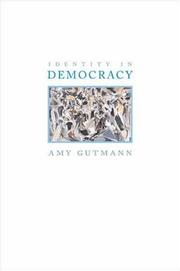
ISBN: 069109652X 0691120404 9786612087288 1282087282 1400825520 9781400825523 9780691120409 9780691096520 9781282087286 Year: 2003 Publisher: Princeton Princeton University Press
Abstract | Keywords | Export | Availability | Bookmark
 Loading...
Loading...Choose an application
- Reference Manager
- EndNote
- RefWorks (Direct export to RefWorks)
Written by one of America's leading political thinkers, this is a book about the good, the bad, and the ugly of identity politics.Amy Gutmann rises above the raging polemics that often characterize discussions of identity groups and offers a fair-minded assessment of the role they play in democracies. She addresses fundamental questions of timeless urgency while keeping in focus their relevance to contemporary debates: Do some identity groups undermine the greater democratic good and thus their own legitimacy in a democratic society? Even if so, how is a democracy to fairly distinguish between groups such as the KKK on the one hand and the NAACP on the other? Should democracies exempt members of some minorities from certain legitimate or widely accepted rules, such as Canada's allowing Sikh members of the Royal Canadian Mounted Police to wear turbans instead of Stetsons? Do voluntary groups like the Boy Scouts have a right to discriminate on grounds of sexual preference, gender, or race? Identity-group politics, Gutmann shows, is not aberrant but inescapable in democracies because identity groups represent who people are, not only what they want--and who people are shapes what they demand from democratic politics. Rather than trying to abolish identity politics, Gutmann calls upon us to distinguish between those demands of identity groups that aid and those that impede justice. Her book does justice to identity groups, while recognizing that they cannot be counted upon to do likewise to others. Clear, engaging, and forcefully argued, Amy Gutmann's Identity in Democracy provides the fractious world of multicultural and identity-group scholarship with a unifying work that will sustain it for years to come.
Pressure groups. --- Group identity. --- Democracy. --- Democracy --- Group identity --- Pressure groups --- Advocacy groups --- Interest groups --- Political interest groups --- Special interest groups (Pressure groups) --- Functional representation --- Political science --- Representative government and representation --- Lobbying --- Policy networks --- Political action committees --- Social control --- Collective identity --- Community identity --- Cultural identity --- Social identity --- Identity (Psychology) --- Social psychology --- Collective memory --- Self-government --- Equality --- Republics --- Political philosophy. Social philosophy --- Philosophy and psychology of culture
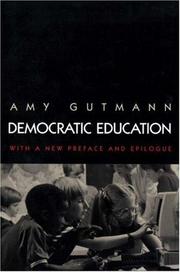
ISBN: 0691009163 9780691009162 1282753649 1400809983 1400816262 1400822912 9786612753640 Year: 1999 Publisher: Princeton: Princeton university press,
Abstract | Keywords | Export | Availability | Bookmark
 Loading...
Loading...Choose an application
- Reference Manager
- EndNote
- RefWorks (Direct export to RefWorks)
Book
ISBN: 9781400822911 Year: 1999 Publisher: Princeton, NJ
Abstract | Keywords | Export | Availability | Bookmark
 Loading...
Loading...Choose an application
- Reference Manager
- EndNote
- RefWorks (Direct export to RefWorks)
Periodical
Year: 1998 Publisher: Princeton Princeton University Press
Abstract | Keywords | Export | Availability | Bookmark
 Loading...
Loading...Choose an application
- Reference Manager
- EndNote
- RefWorks (Direct export to RefWorks)

ISBN: 9781400822911 9780691009162 Year: 1999 Publisher: Princeton, N.J. Princeton University Press
Abstract | Keywords | Export | Availability | Bookmark
 Loading...
Loading...Choose an application
- Reference Manager
- EndNote
- RefWorks (Direct export to RefWorks)
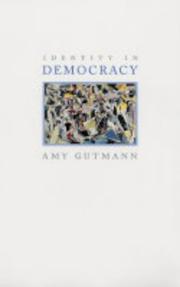
ISBN: 9781400825523 9780691120409 Year: 2009 Publisher: Princeton, N.J. Princeton University Press
Abstract | Keywords | Export | Availability | Bookmark
 Loading...
Loading...Choose an application
- Reference Manager
- EndNote
- RefWorks (Direct export to RefWorks)
| Listing 1 - 10 of 84 | << page >> |
Sort by
|

 Search
Search Feedback
Feedback About UniCat
About UniCat  Help
Help News
News